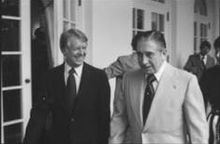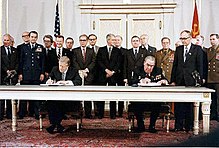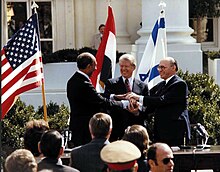Foreign policy of the Jimmy Carter administration
Upon taking office, Carter reoriented U.S. foreign policy towards a new emphasis on human rights, democratic values, nuclear non-proliferation, and global poverty.
Carter ended U.S. support for the Somoza regime in Nicaragua and cut back or terminated military aid to Augusto Pinochet of Chile, Ernesto Geisel of Brazil, and Jorge Rafael Videla of Argentina, all of whom he criticized for human rights violations.
The Trilateral Commission instead advocated a foreign policy focused on aid to Third World countries and improved relations with Western Europe and Japan.
Carter also cut back or terminated military aid to Augusto Pinochet of Chile, Ernesto Geisel of Brazil, and Jorge Rafael Videla of Argentina, all of whom he criticized for human rights violations.
Policy disputes reached their most contentious point during the 1979 fall of Pol Pot's genocidal regime of Democratic Kampuchea following the Vietnamese invasion of Cambodia, when Brzezinski prevailed in having the administration refuse to recognize the new Cambodian government due to its support by the Soviet Union.
[16] His administration also generally refrained from criticizing human rights abuses in the Philippines, Indonesia, South Korea, Iran, Egypt, Saudi Arabia, and North Yemen.
[20][21] In March 1976, the Soviet Union first deployed the SS-20 Saber (also known as the RSD-10) in its European territories, a mobile, concealable intermediate-range ballistic missile (IRBM) with a multiple independently targetable reentry vehicle (MIRV) containing three nuclear 150-kiloton warheads.
[37] Historian George C. Herring states Carter and Brzezinski both saw Afghanistan as a potential "trap" that could expend Soviet resources in a fruitless war, and the U.S. began sending aid to the mujahideen rebels in mid-1979.
[38] However, a 2020 review of declassified U.S. documents by Conor Tobin in the journal Diplomatic History found that "a Soviet military intervention was neither sought nor desired by the Carter administration ...
[41] Carter believed that the Soviet conquest of Afghanistan would present a grave threat to the Persian Gulf region, and he vigorously responded to what he considered a dangerous provocation.
[43][44] Pakistani leader Muhammad Zia-ul-Haq had previously had poor relations with Carter due to Pakistan's nuclear program and the execution of Zulfikar Ali Bhutto, but the Soviet invasion of Afghanistan and instability in Iran reinvigorated the traditional Pakistan–United States alliance.
[40] In cooperation with Saudi Arabia, Britain's MI6, and Pakistan's Inter-Services Intelligence (ISI), Carter increased aid to the mujahideen through the CIA's Operation Cyclone.
Returning to a policy of containment, the United States reconciled with Cold War allies and increased the defense budget, leading to a new arms race with the Soviet Union.
Unable to come to definitive settlement over an Israeli withdrawal, the two sides reached an agreement in which Israel made vague promises to allow the creation of an elected government in the West Bank and Gaza.
[56] Carter, Vance, and Brzezinski all viewed Iran as a key Cold War ally, not only for the oil it produced but also because of its influence in OPEC and its strategic position between the Soviet Union and the Persian Gulf.
Vance and the State Department made it a high priority, while Brzezinski warned that it would undermine the strength of America's most important ally in the region.
[64] In November 1979, shortly after Pahlavi was allowed to enter the U.S., a group of Iranians stormed the U.S. embassy in Tehran and took 66 American captives, beginning the Iran hostage crisis.
[69] The bipartisan national policy of turning over the Canal to Panama had been established by presidents Johnson, Nixon, and Ford, but negotiations had dragged on for a dozen years.
After Carter announced that the United States would provide "open arms for the tens of thousands of refugees seeking freedom from Communist domination", Cuban Americans arranged the Mariel boatlift.
The United States augmented its military strength in the Indian Ocean, seeing it as an extension of the Pacific and a prime link to the Persian Gulf oil supplies.
A highly controversial issue was US relations with South Africa, which was under criticism from other African states for its policy of racial segregation (apartheid) and continued occupation of Namibia, which had been deemed illegal by the United Nations.
[112] Young advocated comprehensive economic sanctions on South Africa after the murder of anti-apartheid activist Steve Biko in 1977, but Carter refused and only imposed a limited arms embargo.
The region emerged as a Cold War battleground in 1976, after Cuba sent a large military force that helped the Marxist MPLA movement seize power in Angola.
Vance and Brzezinski clashed over foreign policy in Angola and Namibia, but the U.S. never became directly involved in either country and the Carter administration never found an effective solution.
But during the second Shaba invasion, the US played a much more active and decisive role by providing transportation and logistical support to the French and Belgian paratroopers that were deployed to aid Mobutu against the rebels.
Carter echoed Mobutu's (unsubstantiated) charges of Soviet and Cuban aid to the rebels, until it was apparent that no hard evidence existed to verify his claims.
Revisionists said that did not matter nearly as much as the intense rivalry between dovish Secretary of State Cyrus Vance and hawkish National Security Adviser Zbigniew Brzezinski.
[127] Along post-revisionist lines, Nancy Mitchell in a monumental book depicts Carter as a decisive but ineffective Cold Warrior, who, nevertheless had some successes because Soviet incompetence was even worse.
[128] Relations with Canada had deteriorated under the Nixon administration on many points, including trade disputes, defense agreements, energy, fishing, the environment, cultural imperialism, and foreign policy.
The late 1970s saw a more sympathetic American attitude toward Canadian political and economic needs, the pardoning of draft evaders who had moved to Canada, and the passing of old matters such as Watergate and the Vietnam War.

















